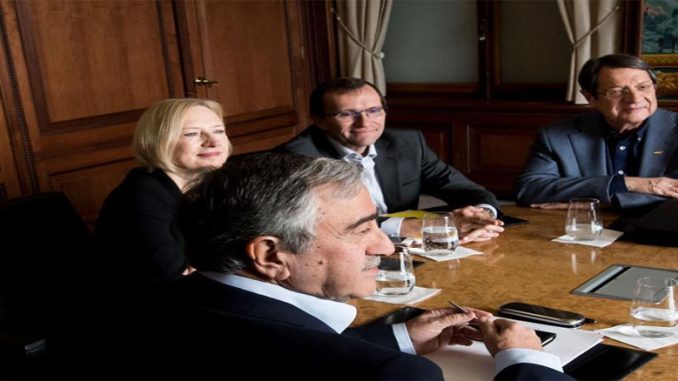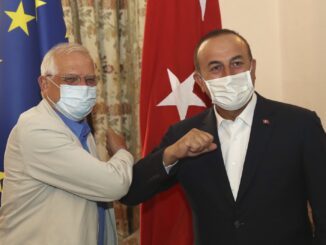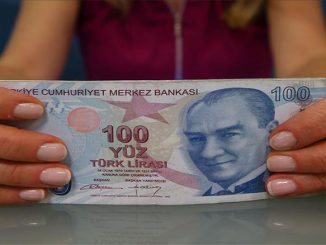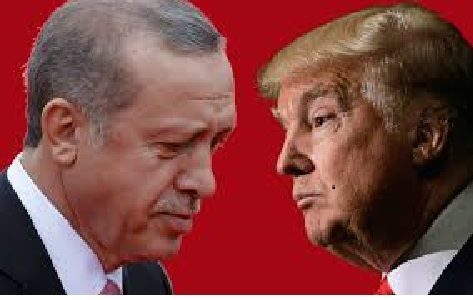
A feud over Cyprus’ troubled history on Thursday led to the abrupt halt of reunification talks between the ethnically split island’s rival leaders, with confusion and finger-pointing over who walked out on whom.
It’s unclear how the negotiations that have led to significant headway over 21 months on a deal reunifying the small island as a federation will move forward.
But both Mustafa Akinci, the leader of the breakaway Turkish Cypriots, and Greek Cypriot President Nicos Anastasiades said they don’t want the process to collapse completely.
United Nations envoy Espen Barth Eide said so far there’s been no change to a scheduled program of future meetings between the leaders and negotiators.
“No one sees this as terminated or even suspended. The process is on,” Eide said after meeting Anastasiades late Thursday.
Tensions ran high this week following strong Turkish Cypriot protests against new legislation making the annual commemoration of a 1950 vote to unite Cyprus with Greece compulsory in Greek Cypriot schools.
Anastasiades said he told the Turkish Cypriot leader that his fears over the legislation weren’t justified and that Akinci and his retinue then left the U.N. compound at the defunct Nicosia airport where talks were being held.
Anastasiades said that Akinci’s departure appeared to be a “pre-determined decision” and a “pretext” in order to justify the Turkish Cypriot side’s harder stance as talks reach the problem’s most sensitive, core issues and to furnish Turkey an excuse to evade its obligation to help the process.
“I don’t accept that it’s possible after two years of intensive negotiations and progress for the process to halt for an insignificant matter, something that’s understood by everyone,” Anastasiades told reporters.
Akinci, though, said Anastasiades gave a “bunch of excuses” and appeared to give short shrift to Turkish Cypriot sensitivities before storming out of the meeting first and slamming the door behind him.
Akinci said what triggered Anastasiades’ anger was U.N. envoy Eide’s suggestion that something had to be done to fix things. Anastasiades said he rebuked Eide for casting doubt on the Greek Cypriots’ commitment to a peace deal.
“As Mr. Akinci himself has said at one point, he decided to leave the meeting,” Eide said.
Akinci said it’s up to the Greek Cypriots to get negotiations back on solid footing.
“We’ve reached this point, but I don’t want to close all the doors to the negotiations,” Akinci told reporters.
Cyprus gained independence from British colonial rule in 1960, but was split 14 years later when Turkey invaded in the wake of a coup by supporters of union with Greece.
A Turkish Cypriot declaration of independence is recognized only by Turkey, which keeps more than 35,000 troops in the breakaway north.
More than 95 percent of the majority Greek Cypriots voted in favor of union with Greece in the 1950 plebiscite which is already taught in Greek Cypriot schools.
Turkish Cypriots see the Greek Cypriot bid for union with Greece that culminated in a 1955-59 guerrilla campaign against British colonial authorities as being the root of the island’s current woes.
According to Turkey’s state-run Anadolu Agency, Turkish Foreign Minister Mevlut Cavusoglu said that the Greek Cypriot legislation “is not acceptable to Turkey or to Cypriot Turks.”
Akinci said that the legislation on commemorating the event, proposed by the far-right party ELAM, fanned concerns among Turkish Cypriots over their security and bolstered mistrust.
Anastasiades said that celebrations and commemorations aim to pay homage rather than signal any policy shift away from reunifying Cyprus as a federation.



